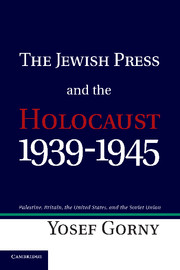 The Jewish Press and the Holocaust, 1939–1945
The Jewish Press and the Holocaust, 1939–1945 Conclusion
The Cry of the Helpless
Published online by Cambridge University Press: 05 November 2011
Summary
The nation, family by family, weeps helplessly today.
Davar, Nov. 24, 1942The global Jewish press during World War II gave public expression to the national existence of the Jewish transnational community and attested to this community’s political powerlessness. Ostensibly, it sounds like an oxymoron. The first term conveys a sense of power flowing from Jewish national unity despite geographic dispersion and cultural diversity. The second term highlights the opposite – political weakness. In fact, there is no contradiction because both terms originate in the Jewish state of dispersion and lack of sovereign national territory. The “transnational community” symbolizes the cohesion that sustained the Jews during their dispersion – the characteristic of persevering “despite it all” – and also the helplessness that reflected their inability to transform this cohesion into a meaningful political tool that could rescue the doomed. During the war, this state of affairs turned the Jews’ transnational community into an imagined community in the eyes of leaders and public opinion in the free world. It happened not because they disregarded the Jews’ human suffering but because they refused to grant Jewry the collective status that they awarded to the other Nazi-occupied peoples. Therefore, they refused to acknowledge that the Jews as a people, unlike other Nazi-occupied peoples, had been condemned to outright extermination. Here lies the tragic and paradoxical meaning of the concept of “powerlessness” or “helplessness” as presented in this book. I use these concepts not to stress the Jews’ weakness against the Nazis’ murderous war machine – which toppled whole nations and armies – but to emphasize their weakness vis-à-vis the anti-Nazi democracies. It is for this reason that the Jews’ leaders and organizations were unable to persuade the leaders of these powers to take meaningful rescue action, even for the few. Powerlessness bred unresponsiveness.
The Jewish leadership in all of its public and political organizations acknowledged the reality of this situation. However, for reasons of political prudence in wartime and the objective political weakness that made them almost totally dependent on the western powers, these leaders could not express the matter publicly except in assemblies for public outcry and protest once the magnitude of the Holocaust became known. The Jewish press did not have these political constraints. Waving the banner of protest, it persistently raised its voice in anguish, for internal and external consumption alike, by vehemently demanding humanitarian aid to those interned in ghettos while this remained possible, and by pressing for firm political intervention after doubts about the perpetration of an ongoing extermination campaign vanished.
- Type
- Chapter
- Information
- The Jewish Press and the Holocaust, 1939–1945Palestine, Britain, the United States, and the Soviet Union, pp. 267 - 274Publisher: Cambridge University PressPrint publication year: 2011


